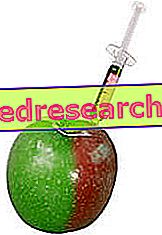
E280 - PROPIONIC ACID
Propionic acid, which belongs to the category of acidifying preservative additives, can be obtained both naturally and synthetically. Propionic acid is produced, in the form of ester of Coenzyme A, by the catabolism of fatty acids and also by the catabolism of some amino acids. Furthermore, it is produced as the final compound of their anaerobic metabolism operated by bacteria of the genus Propionibacterium (which commonly colonize the stomachs of ruminants and human sweat glands).
Propionic acid is a widespread product in nature and comes in the form of a corrosive, colorless liquid with an acrid smell.
In 1844 Johann Gottlieb described and isolated this acid, for the first time, from sugar degradation products; propionic acid was however defined and identified only in 1847, thanks to the French chemist Jean-Baptiste Dumas, who renamed it according to the nomenclature known to us which means "first fat", which symbolizes the fact that it is the first compound of the series of fatty acids.
Propionic acid is used as a preservative additive, particularly for bread and other baked goods, being an inhibitor of mold growth and some bacteria.
Propionic acid (and its salts) are normally used in small doses, but the dosages also vary greatly depending on the various foods. It is in fact a compound that must be dosed very well because of its intense smell.
Propionic acid is often present in cheese, in bread (salts are particularly used), in baked goods (salts are particularly used), in packaged bread, in pizza, in biscuits, in crackers, etc.
The salts of propionic acid (propionates) are:
- E281 PROPINED SODIUM : this salt is often present in baked goods, but it is suspected that it may cause headaches and / or digestive disorders. It is used together with other salts, as a preservative, mainly against mushrooms. ADI DOSE: /
- E282 PROPINATED CALCIUM : this salt is often present in bakery and pastry products. It is used together with other salts, as a preservative, mainly against mushrooms. ADI DOSE: /
- E283 POTASSIUM PROPINATED : this salt is often present in bakery and pastry products. It is used together with other salts, as a preservative, mainly against mushrooms. ADI DOSE: /
The esters of propionic acid are sometimes also used as solvents or as artificial flavors.
Propionic acid is used, in addition to the aforementioned functions, also to cure the "athlete's foot", an inflammation caused by a fungus which, due to the humidity present for sweating, is established between the toes where 'the rooting is easier. It is a common, contagious infection that appears most frequently in the warm months.
It is also used in the synthesis of pesticides and drugs, in particular NSAID derivatives of propionic acid.
It seems that these compounds do not cause negative side effects to the subjects who consume them.
ADI DOSE: /
| E200 | E201 | E202 | E203 | E210 | E211 | E212 | E213 |
| E214-E2119 | E220 | E221 | E222 | E223 | E224 | E225 | E226 |
| E227 | E228 | E230 | 231 | E232 | E233 | E234 | E235 |
| E236 | E237 | E238 | E239 | E240 | E242 | E249 | E250 |
| E251 | E252 | E260 | E261 | E262 | E263 | E270 | E280 |
| E284 | E285 | E290 | E296 | E297 |




